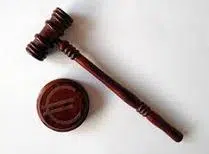Before entering fully into establishing the meaning of the term due process, it is necessary to discover the etymological origin of the two words that give it shape:
-Because, first of all, it comes from Latin. Specifically, it emanates from the verb "debere", which can be translated as "have something from another."
-Process, secondly, also derives from Latin, in its case, from "processus", which is synonymous with "development" or "march".
Due process is called a general principle of law , which establishes that the State has the obligation to respect all the rights that the law recognizes for an individual.
 The principles of law are normative precepts that, beyond not formally integrating a legal system, refer to the structure, content and application of the rules . Legislators, jurists and judges turn to these principles for the interpretation of laws and for the integration of rights.
The principles of law are normative precepts that, beyond not formally integrating a legal system, refer to the structure, content and application of the rules . Legislators, jurists and judges turn to these principles for the interpretation of laws and for the integration of rights.
Due process, in this framework, is the principle that guarantees that each person has certain minimum guarantees so that the result of a judicial process is equitable and fair. Thanks to due process, a subject can be heard before the judge .
When the State does not respect what the law establishes, a violation of due process occurs. This situation can cause harm to the person, who sees their rights violated.
Generally, due process is linked to respect for the rights of a person who, within the framework of the judicial procedure, can go from accused to accused, then prosecuted and finally convicted. All these steps that lead to the conviction must be consistent with the legislation and must be carried out guaranteeing due process. If due process is not followed, it may lead to an unjust or unlawful conviction .
The right to have a lawyer, the right to an impartial judge and the right to express oneself in one's native language - with an interpreter if necessary - are part of due process.
In the same way, it is interesting to know the existence of what is known as fundamental due process, which was used for the first time in the 1930s. Under that name we can establish that there is a theory of United States Law. which establishes the existence of limits imposed by the courts on what is the authority and even the power of the government.
In that sense, what this instrument guarantees is to protect individuals from the promulgation of policies for the majority that, in one way or another, transcend the authority of the aforementioned government.
Likewise, that Law also speaks of what is called procedural due process, whose main mission is to defend citizens from what is the coercive power of the government. To this end, it is guaranteed that the decision processes carried out will be governed by laws that are fair, impartial and valid.
